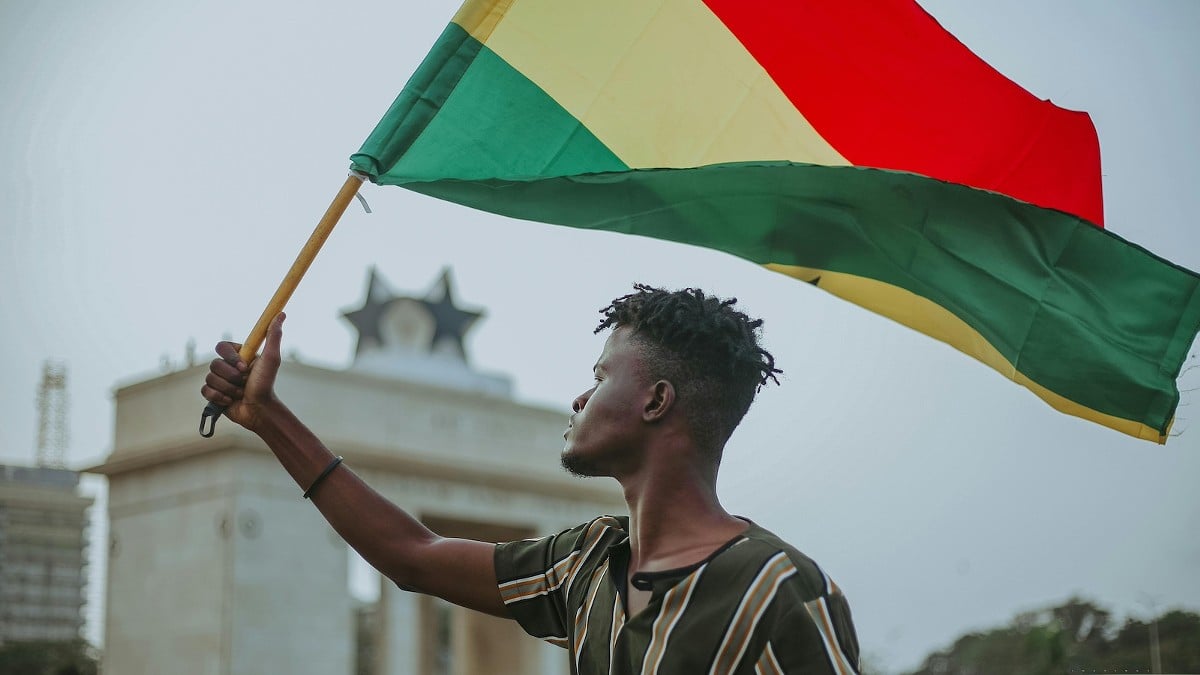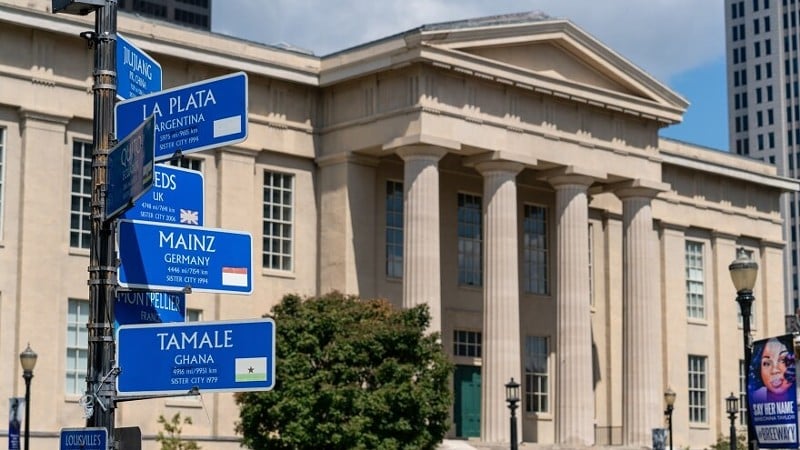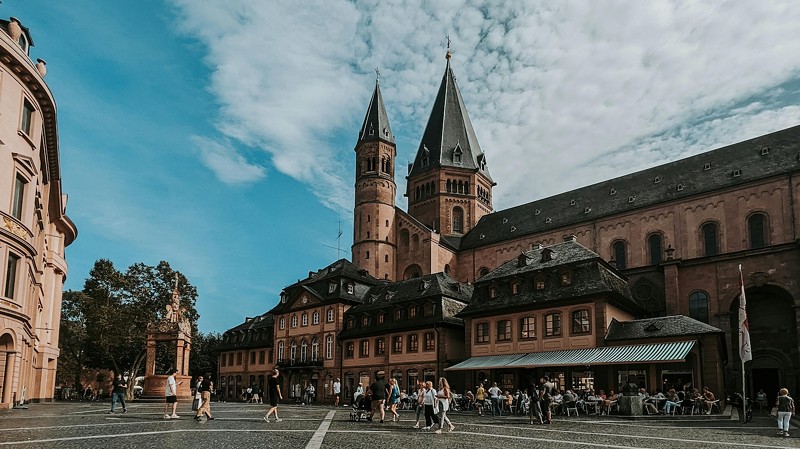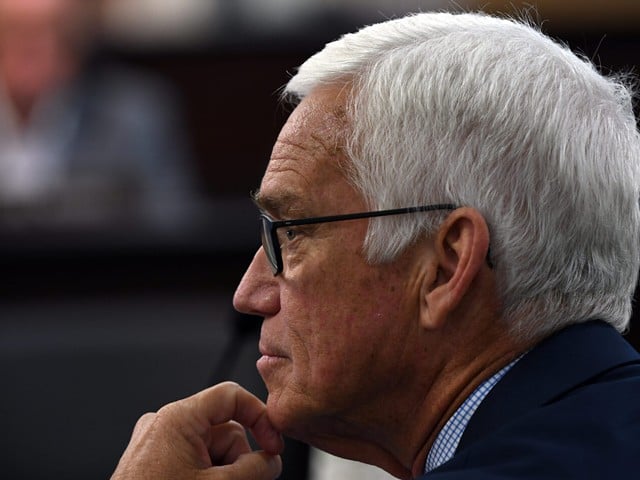The Sister Cities Program has promoted international engagement between Louisville and cities around the globe for 70 years. In June 2024, as Louisville prepares to celebrate anniversaries with five of its nine sister cities, Mayor Craig Greenberg has cut funding to the program.
Past mayors have supported the program because they wanted to showcase Louisville as a city that values its place in the global community. With Greenberg's budget cuts, seven decades of international relationships will be weakened.
Meet Louisville's Sister Cities
Louisville and Montpellier, France have been sister cities since 1954. The relationship began as a student exchange between public universities in Louisville and Montpellier. In 1962, Quito, Ecuador became not only the largest city, but also the only sister city that is a national capital. In 1979, Tamale, Ghana became a sister city, nurturing a partnership between Ghanaian health organizations and the UofL School of Medicine. Although the relationship between Louisville and Mainz, Germany began in 1977, Mainz only became an official sister city in 1994. Also in 1994, La Plata — the capital of Buenos Aires province in Argentina — became a sister city to Louisville.In 2004, the city of Jiujiang in the People's Republic of China became a sister city with Louisville, and the Province of Jiangxi where it is located is a sister state with the Commonwealth of Kentucky. In 2006, Leeds, England became a sister city and students at the Brandeis School of Law at UofL have an academic bridge to study abroad at the University of Leeds. The most recent sister city Adapazari, Turkey who paired with Louisville in 2012. Louisville and Perm, Russia were sister cities until 2022, when Mayor Greg Fischer ended the relationship in response to the Russian invasion of Ukraine.
Standing in solidarity with Ukraine during an escalation of an existent war was a compelling reason for Louisville to end its relationship with Perm. The current defunding of the entire Sister Cities program is not only not compelling — it is troubling.
Establishing Global Connections
Xiao Yin Zhao is Executive Director of the World Affairs Council of Kentucky and Southern Indiana, which serves as the administrator of the Sister Cities Program in Louisville. Since joining the World Affairs Council in 2010, Zhao has facilitated programs with diplomats, authors, and distinguished experts on diverse global issues. She is passionate about engagement between Louisville and global issues. Her belief in the soft power of international cultural exchange and its transformative effect on the communities involved is not diminished by Mayor Greenberg's recent cut.Zhao wants Louisvillians to understand that the Sister Cities Program is more than a ceremonial partnership. In the summer of 2024, Louisville will receive delegations from two partner cities who want to reaffirm and further develop our relations by exploring collaborations on economic development, education, among other culturally vital endeavors. The perception that Louisville, the largest city in Kentucky, might abdicate its responsibility to these established relationships sends a troubling message about our city’s commitment to global cooperation.
"Other cities … have strong relationships, historical relationships, that they really lean into," she says. "If you've been to Philadelphia or Chicago, they've got flags everywhere. Philadelphia has a Sister City Square, a public park of sorts."
Sister Cities is different from any other government-funded program because it is a city-to-city relationship. Sister cities are established by leaders in the highest level of local government (usually mayors), when they sign a memorandum of understanding. "Basically they're saying, my city commits to your city and vice versa. We will share and provide access to resources that can deliver opportunities for our communities to better understand each other."
After Mayor Fischer reduced funding for Sister Cities, the program came to the World Affairs Council, who then took over the program in 2020. "We took it over because it is a strong and important brand. There's so much history," Zhao says. "Our whole mission is to deliver opportunities for our community to be more connected globally, through international exchange, convening programs on global issues, on education. So it was a natural fit."
Cultivating Global Relationships
Zhao's passion for her work is palpable. "A lot of people have been impacted by the exchanges [offered by the Sister Cities program]. We want to keep these relationships alive and continue with these kinds of exchanges, or reimagine what sister cities relationships can be." She describes the amount of funding needed to maintain the program as "a drop in the bucket. I can tell you, it's not a lot of money. It's $36,000. It's tiny."The defunding of the Sister Cities program was a shock to the Wold Affairs Council because it had never been done before. It has been a continuously funded set of programs since Mayor Armstrong (who was in office from 1999 to 2003). "The money is a drop in the bucket for the city's budget. But the risk to our reputation as a welcoming city is huge," Zhao says. "When we say we no longer want to fund and support the work of sister cities, we're saying that all of these 200 plus collective years of relationships we've built with all these different cities don't matter to us."
Reusing to honor the agreements made by previous mayors creates problematic optics for the entire city. "I think most people would agree. If Louisville wants to become a truly international city, the city should attract international investment and resources. Cutting the program — especially for $36,000 — is not a good look for us."
Investing in the Sister Cities program is more than a line item in a budget; it is an investment in the branding of Louisville as a truly global city. Zhao says Louisvile should embrace the relationships that the Sister Cities program fosters. "Mayors are in a powerful position to really make a difference, not just locally, but globally. We know at the national level it can be very difficult to get things done. There's a lot of disunity. Local governments have more support because it's more grassroots. Mayors have the ability to create new cities if they want."
The World Affairs Council wants to create more connections, and the Sister Cities program makes that possible. Zhao says there are people in Louisville’s sister cities who want to see things happen, often around cultural, social, economic, and educational projects. "It's not just about economic development. That can be challenging because mayors are always interested in economic development. As they should be," Zhao says. "But it's these other kinds of exchanges that promote trust, promote a strong foundation upon which we can then build other kinds of relationships."
The Future Of The Sister Cities Program
The World Affairs Council is leading a delegation to Mainz in September that will include a cross-section of Louisville leaders, including at least five Metro Council members. The delegation will celebrate 30 years of continued partnership with Mainz and explore new areas of collaboration in the future."We know there's support there. We're going to try to get it back. But it's ultimately the mayor's decision whether he wants to listen to us. Again, it's not the money, it's the bigger picture."










